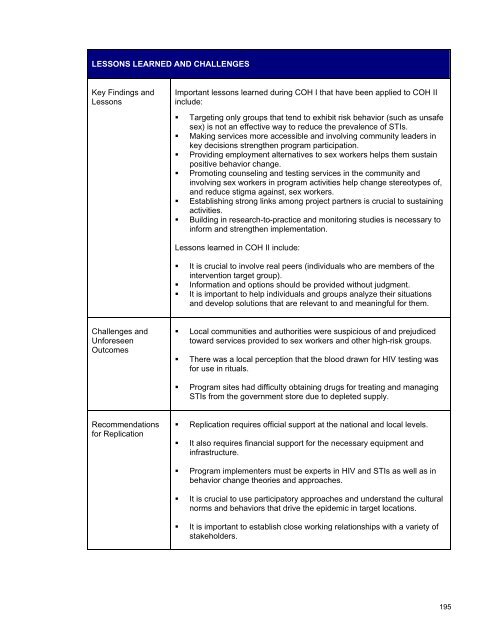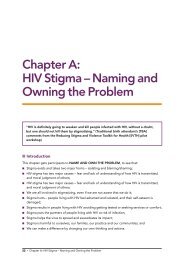Implementing Multiple Gender Strategies to Improve HIV and ... - ICRW
Implementing Multiple Gender Strategies to Improve HIV and ... - ICRW
Implementing Multiple Gender Strategies to Improve HIV and ... - ICRW
You also want an ePaper? Increase the reach of your titles
YUMPU automatically turns print PDFs into web optimized ePapers that Google loves.
LESSONS LEARNED AND CHALLENGES<br />
Key Findings <strong>and</strong><br />
Lessons<br />
Important lessons learned during COH I that have been applied <strong>to</strong> COH II<br />
include:<br />
• Targeting only groups that tend <strong>to</strong> exhibit risk behavior (such as unsafe<br />
sex) is not an effective way <strong>to</strong> reduce the prevalence of STIs.<br />
• Making services more accessible <strong>and</strong> involving community leaders in<br />
key decisions strengthen program participation.<br />
• Providing employment alternatives <strong>to</strong> sex workers helps them sustain<br />
positive behavior change.<br />
• Promoting counseling <strong>and</strong> testing services in the community <strong>and</strong><br />
involving sex workers in program activities help change stereotypes of,<br />
<strong>and</strong> reduce stigma against, sex workers.<br />
• Establishing strong links among project partners is crucial <strong>to</strong> sustaining<br />
activities.<br />
• Building in research-<strong>to</strong>-practice <strong>and</strong> moni<strong>to</strong>ring studies is necessary <strong>to</strong><br />
inform <strong>and</strong> strengthen implementation.<br />
Lessons learned in COH II include:<br />
• It is crucial <strong>to</strong> involve real peers (individuals who are members of the<br />
intervention target group).<br />
• Information <strong>and</strong> options should be provided without judgment.<br />
• It is important <strong>to</strong> help individuals <strong>and</strong> groups analyze their situations<br />
<strong>and</strong> develop solutions that are relevant <strong>to</strong> <strong>and</strong> meaningful for them.<br />
Challenges <strong>and</strong><br />
Unforeseen<br />
Outcomes<br />
• Local communities <strong>and</strong> authorities were suspicious of <strong>and</strong> prejudiced<br />
<strong>to</strong>ward services provided <strong>to</strong> sex workers <strong>and</strong> other high-risk groups.<br />
• There was a local perception that the blood drawn for <strong>HIV</strong> testing was<br />
for use in rituals.<br />
• Program sites had difficulty obtaining drugs for treating <strong>and</strong> managing<br />
STIs from the government s<strong>to</strong>re due <strong>to</strong> depleted supply.<br />
Recommendations<br />
for Replication<br />
• Replication requires official support at the national <strong>and</strong> local levels.<br />
• It also requires financial support for the necessary equipment <strong>and</strong><br />
infrastructure.<br />
• Program implementers must be experts in <strong>HIV</strong> <strong>and</strong> STIs as well as in<br />
behavior change theories <strong>and</strong> approaches.<br />
• It is crucial <strong>to</strong> use participa<strong>to</strong>ry approaches <strong>and</strong> underst<strong>and</strong> the cultural<br />
norms <strong>and</strong> behaviors that drive the epidemic in target locations.<br />
• It is important <strong>to</strong> establish close working relationships with a variety of<br />
stakeholders.<br />
195
















